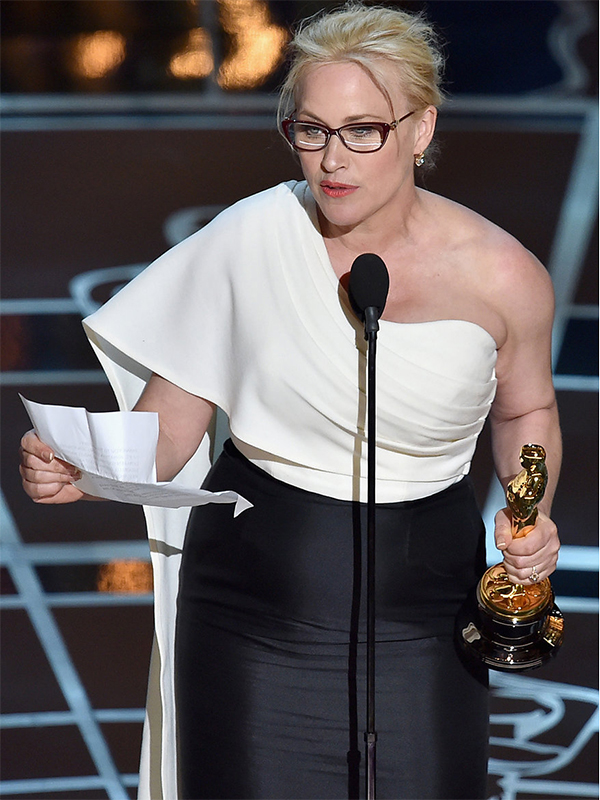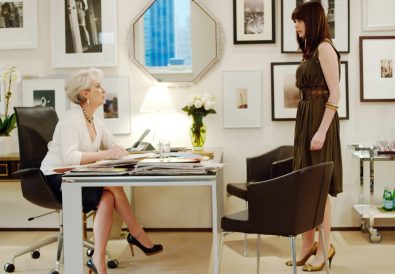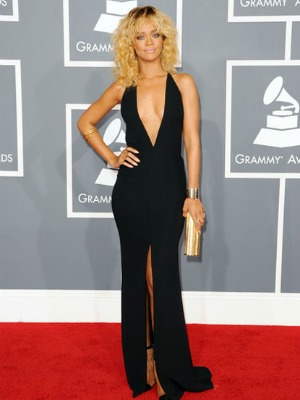Let's just get this out of the way right now: Patricia Arquette's Oscar speech — a.k.a. the speech she made when she won her Oscar for "Boyhood," that we saw on stage — was great. She demanded equal pay and equal rights for women, and she riled the crowd so much that I thought Meryl Streep and J Lo were going to rush the stage, put Patricia on their shoulders, and descend into a chorus of WHOOP there it is.
Which would've been awesome. Patricia Arquette's Oscar speech was awesome. It was her wording after she left the stage that was less so.
"The truth is, even though we sort of feel like we have equal rights in America, right under the surface, there are huge issues that are applied that really do affect women," she said. (And hey: so far so good.) "And it's time for all the women in America and all the men that love women, and all the gay people, and all the people of colour that we've all fought for to fight for us now."
Oh boy.
Now, look. I get what she was trying to say. We all get what she was trying to say. But the thing about being a public figure is that words need to be chosen carefully; that thinking and homework need to happen, always. Here's why.
First, to tell "people of colour" and "all the gay people" to fight for women's rights, no matter how it was meant, erases the LGBTQ communities and women of colour from feminism in general. (This is why White Feminism is so problematic: feminism hasn't exactly been welcoming (#understatement) to women of colour or LGBTQ women, so yet again, with Arquette's sentiment, we've excluded these communities from the conversation.) So again, in moments like these, it sends the same old message: that feminism is a cause that doesn't belong to anybody but white, straight, cis women; that if you are a woman of colour, your feminism isn't the same, and that if you are gay, trans*, bisexual, pansexual, or asexual, your feminism is different, too. Unless you are a straight, white, privileged woman, it's "us" versus "them." Which shouldn't be true.
Which brings us to the second problem: we are never finished — as human beings — fighting for civil rights. Especially since we face civil and human rights violations every day. And to be honest, we haven't done nearly enough for the LGBTQ communities or people of colour to step back and say, "Alright, cool! Your turn now!" (See also: we will never have done enough. Until everybody is treated exactly the same, we should and will be fighting for that right.) Human rights isn't driving on a very long road trip where everybody takes turns. It's HUMAN RIGHTS. And until all humans have rights, we certainly — not as women, not as anybody — don't get to sit back and say, "Okay, now it's your time to fight for us." That's not a thing. That's not equality. Especially since we use marginalizing and damaging language to ask for help: "You over there! Help us!" Nope. That mindset is not conducive to equality. It's conducive to removing women of colour and the LGBTQ communities from our White Feminist conversation.
Did Patricia Arquette think about this when she was rallying the troops? Likely not. But that's also a problem: blanket statements like hers feed into the idea that "women's rights" applies to only a certain kind of woman. It's an ignorance that's ingrained deep within our society, and that ignorance stems from hearing parts of conversations instead of all of them. Odds are, Ms. Arquette did not approach the microphone hoping to alienate and hurt women not covered under her plea. Odds are, she was excited about her award win, surging on adrenaline, and didn't choose her words carefully.
But the rest of us don't have that excuse. The rest of us need to acknowledge that some of what she said was powerful, but the other half is powerful in a damaging way. As human beings, we need to fight for each other, period. You can't schedule when you're going to show up for a cause, especially when the cause hasn't gone — and isn't going — away. And is it all overwhelming? Obviously. But that's why there's power in numbers, not in the erasure of women who aren't white, straight, cis, or, famous.












